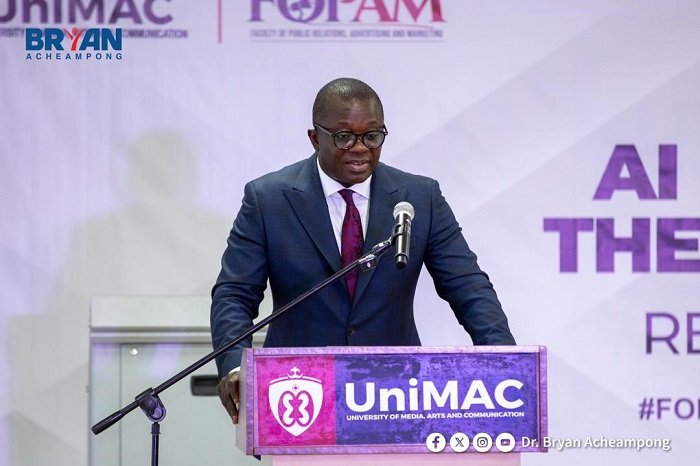Ghana risks being left behind in the global artificial intelligence (AI) revolution, unless urgent and strategic steps are taken to develop a comprehensive national framework, Dr Bryan Acheampong, Member of Parliament for Abetifi, has cautioned.According to him, Ghana lags behind in the AI technological revolution not due its talent or ideas, but due to lack of a coherent national posture on AI.Dr Bryan Acheampong (middle) interacting with some journalists after the event"We do not yet have a structured vision that links AI adoption to economic transformation, job creation, and public sector efficiency," he added.Giving a public lecture at the University of Media, Arts and Communication (UniMAC) in Accra yesterday, Dr Acheampong called for National AI Policy and Inclusive Strategy to Harness Emerging Technologies.Organised by the Faculty of Public Relations, Advertising and Marketing (FOPAM), the lecture was on the theme; "AI disruptions and the future of work, readiness of our youth.""Ghana needs a national AI strategy that is uniquely ours, one that reflects our development priorities, anticipates our demographic trends, and protects our data sovereignty," he added.According to the former Minister of Food and Agriculture, imported AI technology systems may reinforce bias as it exclude local languages, or prioritise commercial metrics over community well-being, adding that AI recruitment tools trained on foreign data may unfairly filter out qualified Ghanaian candidates due to linguistic or institutional biases."What Ghana needs is a national AI strategy that is uniquely ours, one that reflects our development priorities, anticipates our demographic trends, and protects our data sovereignty," he highlighted.Also, to address these challenges, Dr Acheampong proposed two key initiatives: the creation of a National AI Policy Framework to guide development and implementation, and the establishment of a Ghana AI and Emerging Technologies Commission to oversee ethical deployment and coordinate investments.He noted that foreign-developed AI recruitment tools might inadvertently sideline Ghanaian applicants due to flawed datasets, while imported medical AI technologies may fail to detect tropical diseases prevalent in Africa."We must stop being consumers and start building AI that understands us, our environment, and our values," he urged.Dr Acheampong highlighted how other African nations like Rwanda and South Africa had already implemented forward-thinking AI policies, while Ghana lags behind without a coordinated approach.Highlighting AI's potential across key sectors, he emphasized that Ghana could significantly improve food security, education, public services, and the creative economy with the right technological tools."In agriculture, AI-powered tools can assist smallholder farmers with pest detection, weather forecasting, and market access, while education could be enhanced through AI-integrated curricula, personalised learning, and remote instruction technologies," he stated.He emphasized inclusivity, calling for AI education and training programmes to reach rural communities, "Technology must not widen inequality.In her keynote speech, the Rector of UniMAC, Prof.
Christiana Hammond, charged academic institutions to take the lead in preparing the youth for the opportunities and disruptions presented by AI.While acknowledging that Gen Z is already tech-savvy and engaged in the digital space as vloggers, bloggers, and content creators, the speaker argued that academia must provide the strategic push and structured support through updated, skills-driven curricula."We cannot continue to train 21st-century students with 20th-century tools and 19th-century pedagogy," she stated, calling for a shift from rote learning to problem-solving and innovation. BY CECILIA YADA LAGBA

